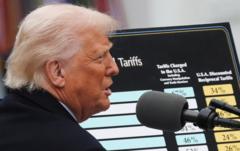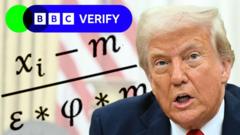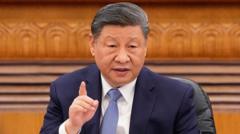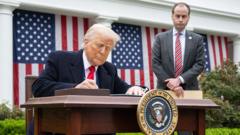Trump's recent tariff declaration, made during a celebratory event at the White House, reflects a long-standing commitment to protectionist economic policies. With tariffs set to reach as high as 50% on certain nations, including China and the EU, this move has ignited widespread debate regarding its implications on both the U.S. economy and global trade relationships.
Trump's Tariff Strategy: A Bold Gamble on America's Economic Revival

Trump's Tariff Strategy: A Bold Gamble on America's Economic Revival
In a significant announcement, President Trump has unveiled sweeping tariffs, marking a pivotal moment in his trade policy aimed at reviving American manufacturing and self-sufficiency.
As President Trump stands firm on his belief that tariffs will foster economic growth and restore American priorities, the long-term impact of this decision looms large. Opponents warn of potential price hikes for consumers and a looming threat of recession, while supporters echo Trump's sentiments of an "America first" strategy, hoping to reshape international trade dynamics. With political and economic challenges ahead, the outcome of this bold gamble remains uncertain.
Despite the fervor of his announcement, questions linger regarding whether this strategy will lead to a new era of American prosperity or prove to be a miscalculated risk with lasting repercussions.
President Trump has consistently believed that tariffs can strengthen the U.S. economy, a conviction he reaffirmed during a recent Rose Garden speech, where he celebrated his new aggressive trade policies in front of supporters. These measures include imposing tariffs as high as 50% on some countries, notably targeting China, the European Union, and South Korea.
The president's rhetoric highlights his long criticism of free trade agreements, claiming that they disproportionately benefitted other nations at America's expense. Trump portrays his tariff strategy as a restoration of America's economic might, framing it as part of a broader mission to "make America great again." However, economic experts are sounding alarms over potential adverse effects on U.S. consumers and the global economy.
Ken Rogoff, former chief economist at the International Monetary Fund, warns that the likelihood of an impending recession could rise sharply due to these tariffs, which he likened to "dropping a nuclear bomb on the global trading system." Critics express concern that the tariffs may alienate traditional allies while escalating tensions with nations seen as economic competitors.
President Trump’s tariffs are positioned not just as a policy initiative but as a cornerstone of his legacy, with ambitions to reshape the global economic order established post-World War II. By emphasizing self-reliance and reducing vulnerability to global supply chain interruptions observed during the pandemic, Trump aims to reposition American manufacturing to the forefront of the economy.
The president's optimism is palpable, yet his comments also hinted at an awareness of the high-stakes nature of this course of action. He envisages history looking favorably upon his decisions—yet, as many analysts suggest, the future may hold challenges that could complicate or undermine these ambitious aims. Whether Trump's tariffs will herald a new economic chapter or result in significant challenges remains to be seen.
Despite the fervor of his announcement, questions linger regarding whether this strategy will lead to a new era of American prosperity or prove to be a miscalculated risk with lasting repercussions.
President Trump has consistently believed that tariffs can strengthen the U.S. economy, a conviction he reaffirmed during a recent Rose Garden speech, where he celebrated his new aggressive trade policies in front of supporters. These measures include imposing tariffs as high as 50% on some countries, notably targeting China, the European Union, and South Korea.
The president's rhetoric highlights his long criticism of free trade agreements, claiming that they disproportionately benefitted other nations at America's expense. Trump portrays his tariff strategy as a restoration of America's economic might, framing it as part of a broader mission to "make America great again." However, economic experts are sounding alarms over potential adverse effects on U.S. consumers and the global economy.
Ken Rogoff, former chief economist at the International Monetary Fund, warns that the likelihood of an impending recession could rise sharply due to these tariffs, which he likened to "dropping a nuclear bomb on the global trading system." Critics express concern that the tariffs may alienate traditional allies while escalating tensions with nations seen as economic competitors.
President Trump’s tariffs are positioned not just as a policy initiative but as a cornerstone of his legacy, with ambitions to reshape the global economic order established post-World War II. By emphasizing self-reliance and reducing vulnerability to global supply chain interruptions observed during the pandemic, Trump aims to reposition American manufacturing to the forefront of the economy.
The president's optimism is palpable, yet his comments also hinted at an awareness of the high-stakes nature of this course of action. He envisages history looking favorably upon his decisions—yet, as many analysts suggest, the future may hold challenges that could complicate or undermine these ambitious aims. Whether Trump's tariffs will herald a new economic chapter or result in significant challenges remains to be seen.






















